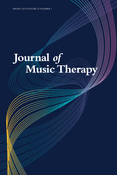-
Views
-
Cite
Cite
Michael J. Silverman, Effects of Lyric Analysis Interventions on Treatment Motivation in Patients on a Detoxification Unit: A Randomized Effectiveness Study, Journal of Music Therapy, Volume 52, Issue 1, Spring 2015, Pages 117–134, https://doi.org/10.1093/jmt/thu057
Close - Share Icon Share
Abstract
Treatment motivation is a key component in the early rehabilitative stages for people with substance use disorders. To date, no music therapy researcher has studied how lyric analysis interventions might affect motivation in a randomized controlled design.
The primary purpose of this study was to determine the effect of lyric analysis interventions on treatment motivation in patients on a detoxification unit using a single-session wait-list control design. A secondary purpose was to determine if there were between-group differences concerning two contrasting songs used for the lyric analyses.
Participants (N = 104) were cluster randomized to a group lyric analysis condition or a wait-list control condition. Participants received either a “Hurt” or a “How to Save a Life” lyric analysis treatment. The Texas Christian University Treatment Motivation Scale—Client Evaluation of Self at Intake (CESI) (Simpson, 2008[2005]) was used to measure aspects of treatment motivation: problem recognition, desire for help, treatment readiness, pressures for treatment, and total motivation.
Results indicated significant between-group differences in measures of problem recognition, desire for help, treatment readiness, and total motivation, with experimental participants having higher treatment motivation means than control participants. There was no difference between the two lyric analysis interventions.
Although the song used for lyric analysis interventions did not affect outcome, a single group-based music therapy lyric analysis session can be an effective psychosocial treatment intervention to enhance treatment motivation in patients on a detoxification unit. Limitations, implications for clinical practice, and suggestions for future research are provided.




